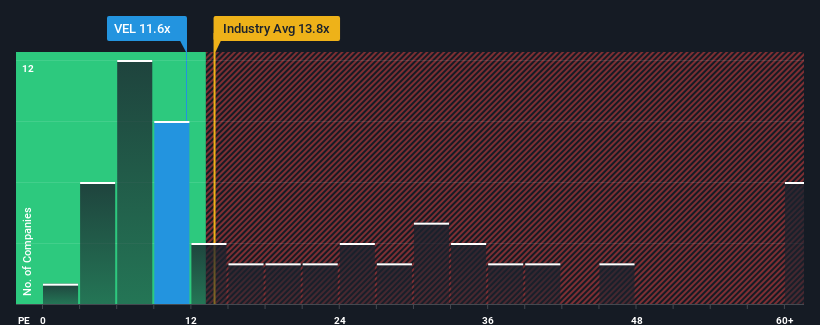- United States
- /
- Diversified Financial
- /
- NYSE:VEL
Benign Growth For Velocity Financial, Inc. (NYSE:VEL) Underpins Its Share Price

When close to half the companies in the United States have price-to-earnings ratios (or "P/E's") above 17x, you may consider Velocity Financial, Inc. (NYSE:VEL) as an attractive investment with its 11.6x P/E ratio. However, the P/E might be low for a reason and it requires further investigation to determine if it's justified.
With its earnings growth in positive territory compared to the declining earnings of most other companies, Velocity Financial has been doing quite well of late. It might be that many expect the strong earnings performance to degrade substantially, possibly more than the market, which has repressed the P/E. If not, then existing shareholders have reason to be quite optimistic about the future direction of the share price.
View our latest analysis for Velocity Financial

How Is Velocity Financial's Growth Trending?
There's an inherent assumption that a company should underperform the market for P/E ratios like Velocity Financial's to be considered reasonable.
Retrospectively, the last year delivered an exceptional 36% gain to the company's bottom line. Although, its longer-term performance hasn't been as strong with three-year EPS growth being relatively non-existent overall. Therefore, it's fair to say that earnings growth has been inconsistent recently for the company.
Looking ahead now, EPS is anticipated to climb by 6.1% during the coming year according to the four analysts following the company. Meanwhile, the rest of the market is forecast to expand by 10.0%, which is noticeably more attractive.
With this information, we can see why Velocity Financial is trading at a P/E lower than the market. It seems most investors are expecting to see limited future growth and are only willing to pay a reduced amount for the stock.
The Bottom Line On Velocity Financial's P/E
Using the price-to-earnings ratio alone to determine if you should sell your stock isn't sensible, however it can be a practical guide to the company's future prospects.
We've established that Velocity Financial maintains its low P/E on the weakness of its forecast growth being lower than the wider market, as expected. At this stage investors feel the potential for an improvement in earnings isn't great enough to justify a higher P/E ratio. Unless these conditions improve, they will continue to form a barrier for the share price around these levels.
You should always think about risks. Case in point, we've spotted 2 warning signs for Velocity Financial you should be aware of, and 1 of them is potentially serious.
If P/E ratios interest you, you may wish to see this free collection of other companies with strong earnings growth and low P/E ratios.
New: Manage All Your Stock Portfolios in One Place
We've created the ultimate portfolio companion for stock investors, and it's free.
• Connect an unlimited number of Portfolios and see your total in one currency
• Be alerted to new Warning Signs or Risks via email or mobile
• Track the Fair Value of your stocks
Have feedback on this article? Concerned about the content? Get in touch with us directly. Alternatively, email editorial-team (at) simplywallst.com.
This article by Simply Wall St is general in nature. We provide commentary based on historical data and analyst forecasts only using an unbiased methodology and our articles are not intended to be financial advice. It does not constitute a recommendation to buy or sell any stock, and does not take account of your objectives, or your financial situation. We aim to bring you long-term focused analysis driven by fundamental data. Note that our analysis may not factor in the latest price-sensitive company announcements or qualitative material. Simply Wall St has no position in any stocks mentioned.
About NYSE:VEL
Velocity Financial
Operates as a real estate finance company in the United States.
Fair value with acceptable track record.
Market Insights
Community Narratives


